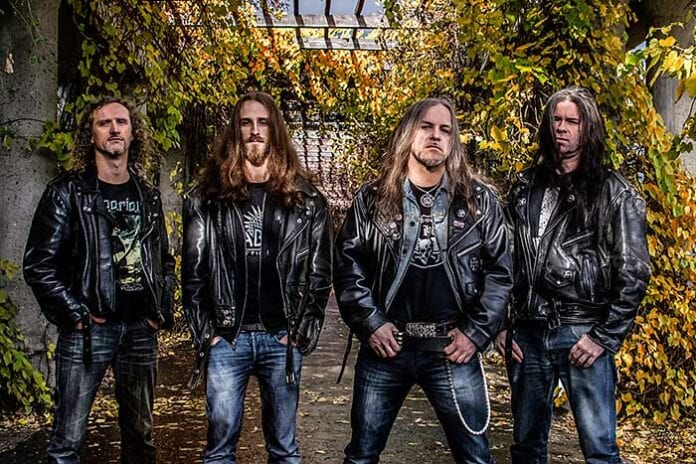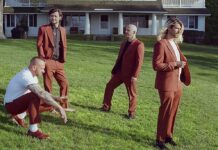
INTERVIEW WITH PIOTR “PETER” WIWCZAREK
BY KEVIN STEWART-PANKO
With a history that clocks back to 1983 and life in the then communist Eastern European country of Poland, death metal graybeards Vader have a long, rich, and compelling history. The struggle of growing up under a restricted social political regime with an albatross-like economy are countered and punctuated by a masterful work ethic that saw the band emerge from behind the Iron Curtain almost as soon as it was humanly possible to offer the world their frustrations and triumphs via ferocious metal played at warp speeds with a hideously sinister air.
Thirty-seven years and a baker’s dozen of full-lengths later, Vader has remained a reliable force on the scene as well as one highly respected not only by fans but the industry—check out the number of times they’ve been nominated for a Fryderyk Award, the Polish Grammy equivalent. On the eve of the release of album number 13, Solitude in Madness, we caught up with guitarist/vocalist/lone original member Piotr Wiwczarek via a one star worthy Skype connection to discuss shifting worldviews, how the need for speed translated into one of the fastest albums of the band’s discography, and looking at the bright side of a global pandemic.
Vader was headlining one of the few North American tours that was able to fully finish before the world went to hell. But aren’t you supposed to be on tour in Europe at the moment?
Well, not right now. We were supposed to have a European tour right after the North American one, but that was done after five shows. We were supposed to play some festivals and special events in May and June, and, of course, all of those were canceled.
“THE NEW ALBUM REMINDS A LITTLE MORE OF THE FIRST ERA OF VADER’S EXISTENCE, JUST DONE IN MODERN TIMES”
What have the reactions been like to the new album?
It’s hard to say, but the reactions to the songs we released as singles, “Shock and Awe” and “Into Oblivion,” have been pretty devastating. I did not expect that good a reaction to the songs, and it’s very promising. Vader is Vader, and I’m sure that Vader fans know what to expect from us. This album might be slightly shocking for all those who joined the Vader empire later, after the last few releases. This is rather something more familiar for those fans that have followed us since the very beginning. The new album reminds a little more of the first era of Vader’s existence, just done in modern times (laughs). Speed and brutality were pretty much the priority for us in the first era, until the end of the millennium. Litany [2000] was the last album that was all about high-speed brutality for us. Then, with Revelations [2002], we started to show a little bit of a different vibe, to give more variety of feeling to the album. There were slower songs, more groovy riffs, samples in the background to give a bit more of an atmospheric feel. After two decades of doing that, I felt the need for speed (laughs), and it was pretty natural. As a music fan, as a metal fan, I had more opportunities to see some bands I love and maybe my blood was running a little bit faster, so the songs came out faster as well.

Was there a particular point during the writing or recording process where it clicked and you were like, “We have an album here?”
Not really. I never know what the final result is going to be like until it’s done. It’s the same with having a plan. I don’t have anything planned out from A-to-Z before entering the studio. There’s a lot of space left for spontaneous work. Of course, there’s a general plan for most of the songs and the drum work is already prepared, but all in all even if we have something done we can still make changes if we feel they are necessary. This is the part of creativity and working in the studio I like. Of course, it may be easier to have everything completely ready and I’m sure some bands do that, but for us we never get that much time to jam and prepare things before. We don’t need that much time to collect all the riffs and ideas to make a song, and to me, it’s just standard and this is how I’ve worked for decades.
“WE WERE WORKING TOGETHER, AND IT WAS SO MUCH FUN IN THE STUDIO EXPERIMENTING WITH NEW IDEAS AND RIFFS”
This time it was even better because we had a new place, we had Scott Atkins as producer, and he’s a very motivated person. We were working together, and it was so much fun in the studio experimenting with new ideas and riffs, the sort of spontaneous work I was talking about. For this album, we were actually ready to enter the studio at the end of 2018, and if we had started recording like we had planned, the album probably would have been different. The whole thing might have been totally fast and blasting, more like songs from the second side like “Emptiness” and “Dancing in the Slaughterhouse.” We spent four weeks on the album, but this was spread out over the whole summer because at the same time we entered the studio, we were supposed to start touring and playing festivals. Then, I had to travel to England [to the studio] after getting home from a tour. It took time, months to do, but was about four weeks of actual work in total.

Is that sort of recording procedure—interrupting a studio session to go play live then coming back—a good or bad thing?
I definitely don’t like that. I hate to split my attention. If I’m working in the studio, I like to be working in the studio. Touring is different. But, it happened and it had to be like that and I had to deal with this, so I just did it. I’m definitely going to be more careful next time. There were certain situations and decisions made that forced us to change our plans, and canceling the shows and tours that were a booked a year before wasn’t an option.
“IT WAS LOOKING AT US IN A WORLD OF SOLITUDE, HOW PEOPLE CAN FEEL ALIENATED FROM THE MADNESS AND THE CRAZINESS OF THE WORLD AROUND US.”
Is there a story or significance to the album title, Solitude in Madness, and is there a theme running through the lyrics?
I really like to leave interpretations to the fans. The lyrics are personal and subjective, and it’s supposed to stay like that. But the title is something that I adopted pretty late when we were in the studio. I usually start with a title or a working title and it occasionally stays. If I have a title, I feel better (laughs). It’s like I’ve started something, started the next chapter. In the studio, I found the one line from “Bones,” the last song on the album, to be interesting and just used it as the title. Solitude in Madness can mean anything. For me, it was looking at us in a world of solitude, how people can feel alienated from the madness and the craziness of the world around us. You can observe how many people just live separated from the manic world, especially with technology and how people on the bus or train or whatever are just staring into their phone, totally separated from everyone else, even if they’re gathered together. On the other hand, you can look at it a different way—how people like to be separated from the world because they can’t adapt or don’t like the ways of the modern world and they like to stay in the shadows and in solitude. But like I said, interpretation belongs to the listener and this is what we like to do, we like to push people to think and use the beautiful gift of their imaginations. I like to express myself, and each song I write is a piece of my life, something I’ve been thinking about or have experienced that I’ve transformed into a story that can be interpreted differently by different personalities, and that’s what I like about metal as a fan, not just as a creator.

With time and experience, things change. When you go back and look at Vader’s early stuff, does it strike you as very different? Or do things still seem similar and along the same lines in your mind?
Umm…similarity, I can accept that, but it’s definitely not the same. There’s a huge difference between the new album and our debut, The Ultimate Incantation. It’s over 30 years of experience and traveling the world. When I started the band, I was a teenage boy who was just angry and hated everything and wanted to be a rebel. I had long hair because I was forbidden to and I would walk around with a handmade jacket with handwritten band logos on it, and everybody hated it because nobody understood the music and called it noise. We loved that because we wanted to be different. In Poland in the 80s when we started, everything was grey and boring and there was nothing really interesting for us as teenagers. So, heavy metal and the music was something we escaped to and we pictured our own world and that helped a lot.
“IN VADER, EVERYBODY CAN FIND SOMETHING, AND THAT’S WHY WE HAVE FANS THAT STILL SUPPORT US”
As young musicians we wanted to scream loud and angry, and that’s what we still do, only better. Of course, we use some of the same symbolism and the same meanings, but the experience and age has given me something deeper in the background. If I’m talking about hell and Satan, it may be being done in name, but there’s a deeper story behind it, some reality behind the story and that’s a huge difference. That’s probably why young fans come out to our shows. The language we speak can find everybody, everybody can find something in there. We’re not creating the music for specific persons by age or nature. In Vader, everybody can find something, and that’s why we have fans that still support us and are waiting for the next albums. We have some really young fans, and that makes me proud and happy because the music breaks all barriers—time, age, nation, religion, everything. That’s the best thing about what we do.
You grew up in Poland behind the Iron Curtain, but started to travel to the West almost as soon as the Curtain came down, recording your first album in the UK in the early 90s and touring the world soon after. What were your first impressions of the West, and when did you start to see changes in Poland?
It took time. In the 80s and 90s, Poland was still far from being a part of Europe. It took decades, and I still think that mentally Poland is not entirely westernized. Poland was always in between the West and the East. There’s even a joke about how God made Poland as a joke and put it between Germany and Russia. It may be a bad joke, but it’s a joke (laughs). The problem is that we should have profited from that situation, being a bridge between two worlds, but our mentality never allowed us to profit. But, Poland and Polish people have always been a little bit eastern and little bit western. It’s interesting, but honestly we were always kind of alien from both sides. That’s why Poland is so special economically and politically, and that’s why the music that came from here was special as well—it’s pretty angry. I think anger is in the DNA of Polish people. But the first time I touched western soil, it was like a different world. We were already musicians, so it was a little easier for us. We were in touch with other people around the world through tape trading, we were in touch with some bands from the West, and we were younger, so it was easier to understand some situations because we were totally not interested in politics.
The only thing that was really shocking to us was the economy. The record stores were shocking because there was nothing like it in Poland. We would focus on these details that nobody would really care about today. In 2010, when the border ceased to exist, that helped to bind Poland with the West a lot. Today, if you see Poland and Germany, they’re pretty much the same. There are natural differences, language differences, some cultural differences, but the stores are the same, the McDonalds are the same (laughs) and it’s just regular. I could even say it’s boring (laughs). But as kids, we dreamt of having this sort of opportunity, to have albums in stores, equipment available for everybody, regular food, and a choice. The biggest problem with old Poland was that there was no choice, no options and now it’s just regular. But, of course, the younger generations cannot feel or know the difference. Sometimes I try to understand why there isn’t respect for what they have, but it’s because they just have it, so why should they respect it?
What were the experiences like when you started to emerge from the East to play shows?
We started to play shows pretty early, but it was just local places like student clubs in our city. I think that was ‘84 and ’85, after the first album was released on Earache. The contract provided tour support, so in the spring of 1993 we hit the road with Bolt Thrower and Grave in Europe for a month, and right after we traveled to the US for the first time and spent about a month doing two tours, one right after the other. We started with Deicide and Dismember and then we did another round with Suffocation and Dismember, and that was really huge for Vader because we were playing for really big crowds. It was pretty good times. Years later, when I had the chance to chat with some friends, we found out there were some people and bands that knew Vader from our Morbid Reich demo tape, and we never expected that a tape recorded in a poor studio in Poland back in 1990 would be inspiring for some American bands creating their extreme metal. It looked like we were inspiring each other (laughs).
“WE NEVER EXPECTED THAT A TAPE RECORDED IN A POOR STUDIO IN POLAND BACK IN 1990 WOULD BE INSPIRING FOR SOME AMERICAN BANDS”
How has a career in death metal worked with your personal life?
It’s not too much trouble. If you’re in a band like Vader and you find a partner, it should be someone who accepts that. I’m absolutely happy that I found Marta and we became parents pretty early. Actually, when we were releasing the second album, we already had two kids and we could deal with it. It wasn’t easy because we were living together in a rented flat and it was long before we had decent money. For a long time, we were living together with Marta’s mother and it wasn’t easy, but it was one of the funnest and happiest times I remember. The band had created one of our best albums around that time and I was so close with my kids and I was happy, so nobody cared about troubles too much and we focused on the good things.
Would you say you worldview became drastically different after traveling out of the East, especially when compared to your Polish friends or family that haven’t traveled as much?
Definitely. When you see more of the world, you know more about everything. The first time I went to the US, Japan, and other countries, it was a shock because it was the first time I’d experienced cultures that were so drastically different than in Poland. But later on when I would visit more often, I would also discover the bad sides of those places. It’s good to know everything—or as much as you can—about other lands, not just the beautiful parts, because that gives you a bigger picture of everything. It’s also better for creativity as an artist. I’m always trying to talk about my experiences to my family, if I have the opportunity. And I put those experiences into songs and express those emotions, especially the bad ones, through the songs. It’s much better than keeping that anger and frustration inside. That’s one of the reasons that metal helps me so much.
Has the band, your management, or label discussed how the Coronavirus might impact Vader, the music industry, and what might happen in the future?
What’s happening is definitely going to provide material for the next album (laughs). I’m kidding, but not kidding because I’ll probably write something about what’s going on now in the future. It is something very worthy of talking about. I know that this situation is not going to last forever and I try to see the bright side of it, even if we know that locking down the borders and staying in isolation isn’t good. If you try to understand the situation, you know that this is what we have to do in order to get back to normal life. We should be somewhat happy because the last huge pandemic was 100 years ago and it was so much worse. Imagine a situation where you know nothing or very little about it? Today, we have technology and it helps a lot to save lives. I usually dislike technology because it’s stealing our lives away, but in this moment, it’s helping to save lives, and that’s why we should understand the balance and use tools and technology if necessary, not just because we have it.
“WE SHOULDN’T BE CRYING AFTER ONE MONTH OF ISOLATION ABOUT HOW BAD THINGS ARE.”
Imagine the situation 100 years ago without the internet and connection and people weren’t informed and knew nothing about what was happening. And also, the Spanish Flu pandemic happened right after the first World War and people badly wanted to meet and be together, but they knew very little about what was going on. Today, we have 100 years of medicine evolution, we have the internet, so we can stay isolated but still be connected and stay informed. So, this is a much better scenario and hard to compare the situation to the past. We shouldn’t be crying after one month of isolation about how bad things are. We should be happy it’s only been once in 100 years and that we have the tools to make it easier. As a musician, for me to live with no shows is pretty deadly, but I believe it’s not going to be like this forever and we just need to get through the next few months to get back to a healthy world. Crying about it doesn’t help and never did.





















